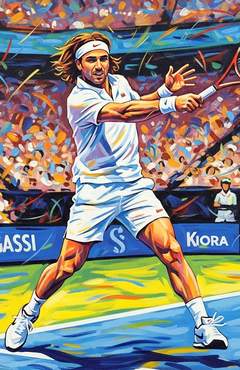.jpg) When you first dive into Andre Agassi’s outstanding memoir, Open: An Autobiography (2010,) you’re hit with a shocking revelation right on the first page: “I play tennis for a living, even though I hate tennis, hate it with a dark and secret passion, and always have.”
When you first dive into Andre Agassi’s outstanding memoir, Open: An Autobiography (2010,) you’re hit with a shocking revelation right on the first page: “I play tennis for a living, even though I hate tennis, hate it with a dark and secret passion, and always have.”
This bewildering confession comes from one of the greatest tennis players of all time, a man who has racked up numerous accolades, including eight Grand Slam titles. The persona of a dedicated tennis champion pursuing his dreams turns out to be a facade.
Behind the Glory: Playing Through Pain
Agassi’s candid reflections highlight the internal conflicts and emotional challenges that often accompany the pursuit of success. His experience was overwhelming; he never truly had a choice in playing tennis, as his father forced him into it at a young age. What followed felt like a glorified prison camp, where the only way out was to succeed—something he did spectacularly, landing him on the world stage. Yet, by the time Agassi came to this realization, he felt trapped, believing there was nothing else he could pursue.
In Open, Agassi relives the feelings of powerlessness that fueled his detest for the very sport that had given him so much. When a job becomes all-consuming, it’s easy to develop a loathing for it. Being the best means everything revolves around performance, and the pressure to stay at the top is relentless. Failure is unacceptable, and the burden of tennis looms over every decision. Burnout becomes inevitable.
 Agassi casts himself as a victim of his circumstances, expressing a weariness with the grind—a sentiment many can relate to. While few may hate their jobs as intensely as Agassi did, many struggle with the meaning of their work, questioning its eternal significance and fearing they are merely wasting time.
Agassi casts himself as a victim of his circumstances, expressing a weariness with the grind—a sentiment many can relate to. While few may hate their jobs as intensely as Agassi did, many struggle with the meaning of their work, questioning its eternal significance and fearing they are merely wasting time.
The Dark Side of Success
For years, Agassi believed real life was just around the corner, delayed by obstacles, unfinished business, and unsettled debts. Eventually, he realized those very obstacles were his life. Life isn’t something that happens to you; it’s something you shape with your choices and actions. You are the director of your own existence. Emotions like anger, jealousy, and fear aren’t just reactions, they’re nurtured. As long as you view yourself as a victim, success will remain out of reach.
Ultimately, there’s no point in toiling through the grind if you don’t enjoy the journey. Embrace the call that stirs your soul. In retirement, Agassi discovered new passions, particularly in education reform. He founded the Andre Agassi Foundation for Education, dedicated to improving opportunities for at-risk children. In his personal life, he met and married German tennis star Steffi Graf, who provided unwavering support, helping him navigate his post-tennis identity. Together, they embraced new ventures, illustrating Agassi’s resilience and his ability to make meaningful contributions beyond the tennis court.
 There’s a familiar drift to human existence: most people stumble through life—nudged by inertia, lulled by routine,
There’s a familiar drift to human existence: most people stumble through life—nudged by inertia, lulled by routine,  David McCullough Jr., son of historian
David McCullough Jr., son of historian  Most people look for big wins. Most people want rapid progress. Most people aim to knock it out of the park. This is
Most people look for big wins. Most people want rapid progress. Most people aim to knock it out of the park. This is .jpg)
.jpg)
 Christensen tells
Christensen tells